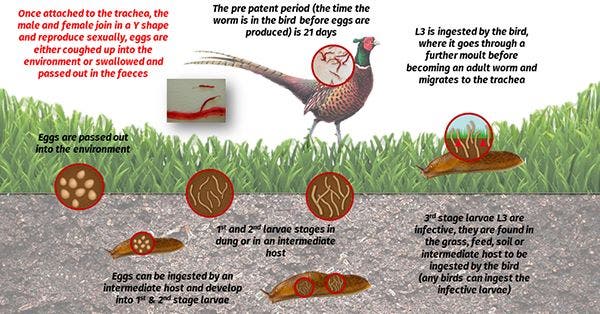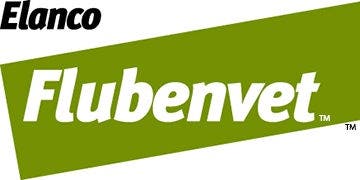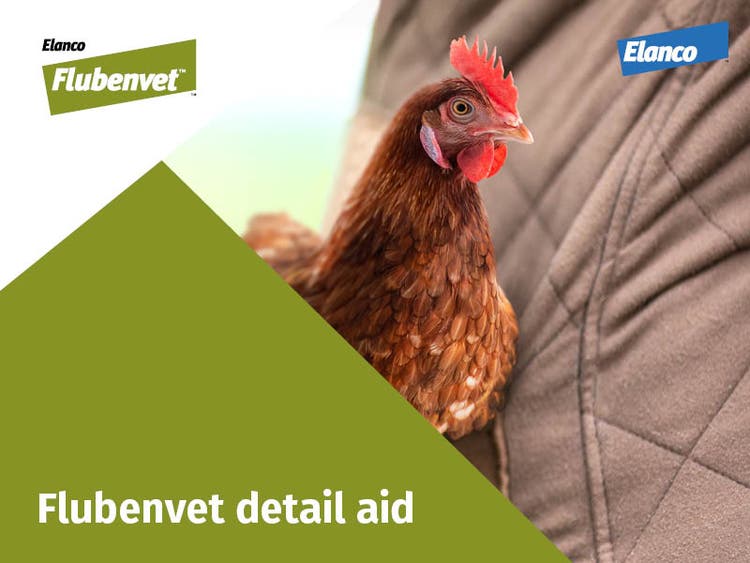Protect your poults
Studies have found that all estates across the country are infected with worms. Young birds are particularly susceptible to the threat of infection because when they are moved into the release pens their naïve immune systems can become overwhelmed with new parasitic challenges.
Therefore, it is important to ensure that rearing pens are set up on clean ground each year, by moving or rotating pens. Leaving pens on the same ground as previous seasons risks exposure to viable worm eggs that are very resilient and can survive in the environment for over a year.
Ensuring good hygiene and biosecurity
Equipment should also be disinfected before use, as this will reduce the immediate exposure to high adult worm burdens, and other parasites in the pen. However, worm eggs can resist destruction by many commonly used farm disinfectants, so it is vital to also treat your birds with a dewormer that is licensed for eliminating worm eggs as well as adult worms. Flubenvet™ is the only dewormer for pheasants and partridge that is licensed for killing all stages of the major parasitic worms’ lifecycles (eggs, larvae and adults). In addition to proactively deworming birds, it is key to remember that worm eggs or larvae can be brought onto the premises via staff clothing, footwear, feed bags, wild birds, litter and many more, so practicing good hygiene and biosecurity can help control the worm burden.
The impact of gapeworms
If your birds become infected with worms, they will produce many more infectious worm eggs that will build up in the environment, increasing the risk of disease. These worm eggs far outnumber the adult worm challenge and can survive in the soil for a prolonged time. Gapeworms are well known as one of the biggest challenges to pheasants and partridge, as they are a major cause of respiratory infections and mortality. Gapeworm eggs mature in the environment or intermediate hosts, such as earthworms and snails, into infectious larval stages which are ingested by birds. Infectious larvae can survive in earthworms for up to three years, providing a continuous pool of reinfection across multiple seasons, unless birds are effectively dewormed.

Once ingested by the bird, adult gapeworms inhabit the lungs and windpipe, causing the bird to ‘gape’ or ‘snick’ while struggling to breathe. Often birds can experience weight loss and concurrent infection with other diseases including hexamita and coccidiosis, due to the immunosuppressive effect of gapeworms on the bird. In addition to the adult worm, the immature life stages of the parasite damage the bird whilst burrowing from the intestines, through the lungs towards the trachea (windpipe). Despite their ability to persist in the environment for long periods, the gapeworm lifecycle is rapid; eggs take 7-14 days to develop into immature larvae and it only takes a further 7-14 days before new eggs are produced from the adult worms.
As with other species of parasitic worms, gapeworms are not specific to gamebirds. These parasites can also infect wild birds, leading to a continual re-introduction of worms to clean ground via the faeces. Therefore, it is important that birds are dewormed at regular intervals, shorter than the lifecycle of the parasitic worm, to prevent larvae developing into adult worms that can produce more eggs. Hence, it is key to use a dewormer that targets the larval stages of worms. Immature, fast-developing worms are particularly susceptible to Flubenvet’s mode of action and treatment can be repeated every 3 weeks during rearing.
Fighting the weather
Weather also has a significant impact on the worm challenge that birds will experience, as moisture on the ground encourages worm eggs to hatch into the infectious larval stage. Furthermore, when it is wet birds tend to seek water from puddles or droplets on grass and foliage, and as a result consume less water from drinkers. This, alongside varying water quality in the release pen, can make soluble medication much less reliable and effective. Often it is also necessary to provide concurrent treatments in the water, for example anticoccidials or antimicrobials, which adds pressure on the water system and the compatibility of multiple medications at the same time must be considered.
Flubenvet is administered via the feed over 7 days, which can offer a convenient and reliable route of treatment. However, during this period of unprecedented increase in the cost of feed, you may be unable to invest more in feed. Therefore, Elanco has partnered with a new manufacturer to offer Flubenvet at a more cost-effective price. This means that when it comes to cost savings you won’t have to compromise the health, welfare and productivity of your birds.
More Materials

Flubenvet™ 5% w/w premix for medicated feeding stuff.
A broad spectrum oral anthelmintic containing Flubendazole.

Flubenvet detail aid
Discover more about how worms affect the health and welfare of your birds.
- Draycott, R. A. H., Parish, D. M. B., Woodburn, M. I. A., & Carroll, J. P. (2000). Spring survey of the parasite Heterakis gallinarum in wild-living pheasants in Britain. Veterinary Record, 147(9), 245-246.
- Flubenvet SPC